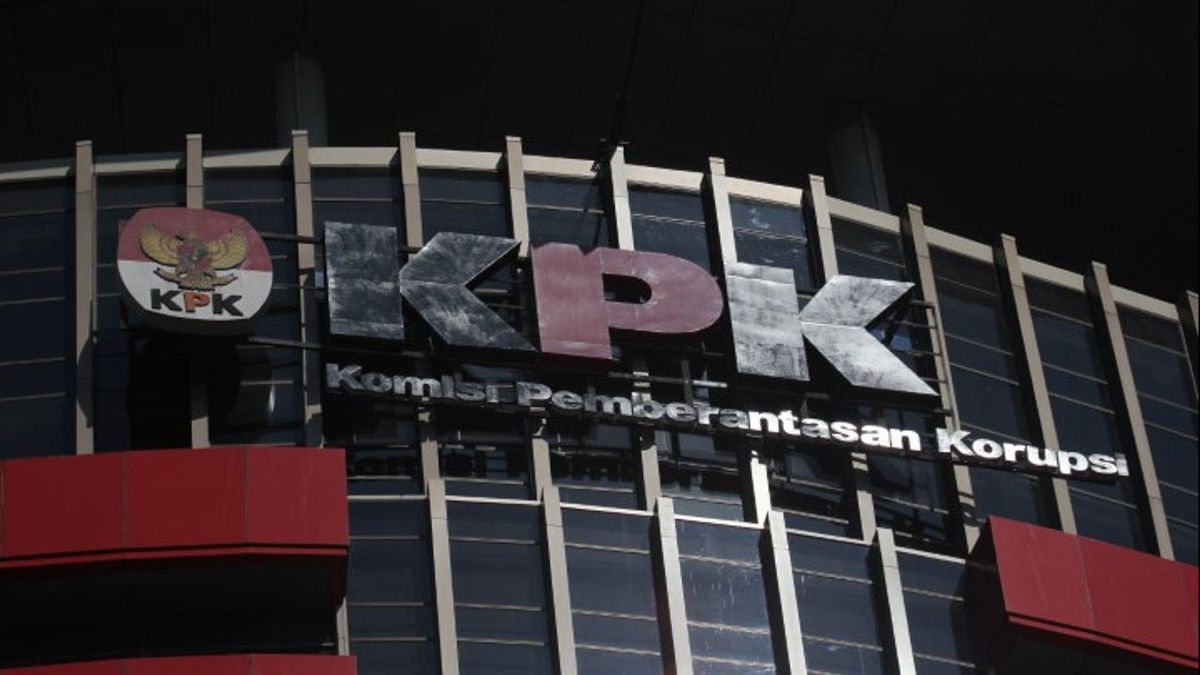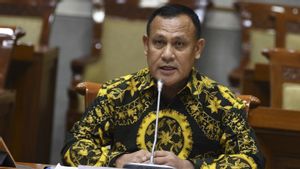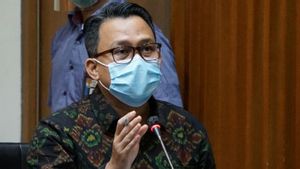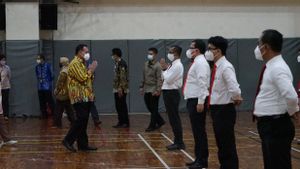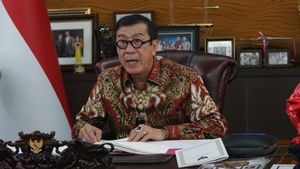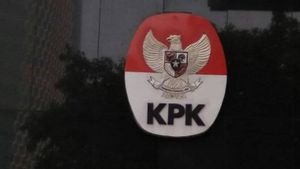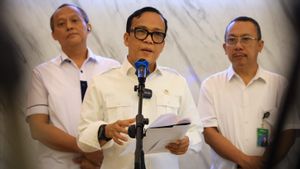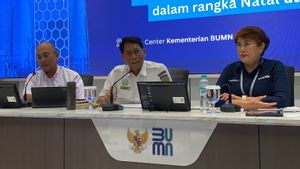JAKARTA - The Indonesian Ombudsman found procedural irregularities in the process of transferring the status of an employee of the Corruption Eradication Commission (KPK) to a State Civil Apparatus (ASN) through the National Insight Test Assessment (TWK).
The findings were conveyed by the Indonesian Ombudsman after the team they formed, namely Team 6, investigated and asked for information from a number of parties for approximately two months. The investigation was carried out after representatives of 75 employees of the anti-corruption commission complained about alleged maladministration some time ago.
"In general, we found maladministration from the results of the examination," said Chairman of the Indonesian Ombudsman Mokhammad Najih in an online press conference broadcast on the Indonesian Ombudsman's YouTube account, Wednesday, July 21.
He said his agency focused on examining allegations of maladministration on three main issues. First, in a series of policy formation processes, the process of transitioning the status of KPK employees to State Civil Apparatus (ASN).
Next in the process of implementing a series of status transfers. Finally, the alleged maladministration at the stage of determining the results of the TWK assessment.
"Three things that the Indonesian Ombudsman found potential for maladministration. We have conveyed the results of the examination to the Chair of the KPK (Firli Bahuri), the Head of BKN (Bima Haria Wibisana), and President Joko Widodo so that the findings of maladministration found can be followed up and further steps are taken," he said.
SEE ALSO:
A number of findings from the Ombudsman regarding TWK maladministration
RI Ombudsman member Robert Na Endi Jaweng explained that in the stages of policy formation, procedural irregularities and abuse of authority were found in the harmonization meeting.
Where in the implementation of the harmonization meeting, there are leaders of ministries and institutions that should be coordinated and led by the Director-General of Legislation.
"Meanwhile, the abuse of authority, the signing of the minutes of harmonization, was carried out by parties who were not present at the harmonization meeting," said Robert.
"While those present at that time were the Head of the BKN, the Head of LAN, the Chair of the KPK, the Minister of Law and Human Rights, and the Minister of PANRB. Those who signed were the Head of the KPK Legal Bureau and the Director of Legislation, Translation, and Publication of Legislation at the Directorate General of PP, Ministry of Law and Human Rights. human rights," he added.
In addition, the KPK has deviated from procedures by not disseminating information on draft regulations through their internal system. In fact, the leadership should inform the employees of all changes that occur in the process of harmonization meetings.
Furthermore, the anti-corruption commission together with the State Civil Service Agency (BKN) was found to have backdates or pushed back the date of the memorandum of understanding and the self-management contract.
Robert explained that the memorandum of understanding for the procurement of goods or services through self-management between the KPK and BKN was signed on April 8, 2021, and the contract for self-management of the KPK and BKN was signed on April 26, 2021. However, this signing was actually made as if it happened on January 27.
Thus, the implementation of the TWK on March 9 has not yet gone through the signing of a memorandum of understanding and a self-management contract.
Furthermore, the Ombudsman also said that BKN was incompetent in carrying out the status transfer test. The reason is that the agency does not have components in the form of measuring instruments, instruments, and assessors, and has requested assessment facilities from five other institutions.
So, instead of running, BKN should convey it to the KPK as a service user in the assessment process.
It did not stop there, BKN also did not master the copy of the Commander's Decree Number Kep/1078.XVII/2016 as the basis for implementing the TWK.
"In this series of processes, BKN then only becomes an observer, only a monitor. Meanwhile, the implementers of the TWK assessment, in the end, are assessors from five institutions," he said.
The five institutions in question are the State Intelligence Agency (BIN), the TNI Strategic Intelligence Agency (BAIS TNI), the Army Intelligence Center, the Army Psychology Service, and the National Counterterrorism Agency (BNPT).
Non-active KPK employees are surprised by the findings of the Indonesian Ombudsman
The findings were then responded to by representatives of 75 employees who were declared not to have passed the TWK and were disabled. Rasamala Aritonang said that his party admitted that they were surprised and did not expect the findings announced by the Indonesian Ombudsman to reveal something deeper than the allegations and reports previously submitted.
"We are surprised that the Ombudsman's findings reveal something deeper than we thought at the start of the report," he told an online press conference.
Rasamala said their report initially only projected a number of simple administrative irregularities. "But the results of the Ombudsman's examination turned out to find more serious violations of the law by the KPK leadership in carrying out the process of transferring the status of KPK employees," he said.
Referring to these findings, there are three keywords that were taken seriously by dozens of employees, including maladministration, procedural violations, and abuse of authority.
Therefore, these employees take into account the legal remedies that will be taken to investigate such serious violations. It is important to know the motives behind the actions taken by the KPK leadership and related parties.
This is because their actions not only have implications for each employee who is declared not to have passed the TWK but also for wider efforts to eradicate corruption.
"For example, what are the motives of the Head of the Legal Bureau of the KPK and the Director of Laws at the Ministry of Law and Human Rights who signed the minutes of the meeting which they did not attend but were attended by the head of the institution? did not want to sign the meeting they attended," said Rasamala.
In addition, these employees also questioned the motives of the Head of BKN who volunteered to carry out TWK even though they were not competent and did not even have the implementation instruments. "Including, for example, contract documents whose dates are intentionally backdated," he said.
"This motive needs to be seriously investigated what its purpose is and the element of intent in it. This further investigation is important to see any indications and various possibilities including potential violations," said Rasamala.
Rasamala hopes that the corrective steps that have been conveyed by the Ombudsman to the two institutions, namely the KPK and the State Civil Service Agency (BKN) can be carried out. Moreover, ethically what is conveyed is morally binding.
"Similarly legally. The findings are legal decisions issued by state institutions that must be respected and implemented by all parties, especially law enforcement agencies," he concluded.
For information, the National Insight Test was attended by 1,351 KPK employees. Of these, 1,274 people were declared eligible and appointed as ASN.
Meanwhile, 75 employees including senior investigator Novel Baswedan, Chairman of the KPK Employee Forum Yudi Purnomo, Director of Socialization and Anti-Corruption Campaign Giri Suprapdiono, Head of the KPK Task Force Harun Al-Rasyid, and Director of PJKAKI Sujarnarko, who will retire, were also declared ineligible (TMS). While the other two employees did not attend the interview test.
The English, Chinese, Japanese, Arabic, and French versions are automatically generated by the AI. So there may still be inaccuracies in translating, please always see Indonesian as our main language. (system supported by DigitalSiber.id)
